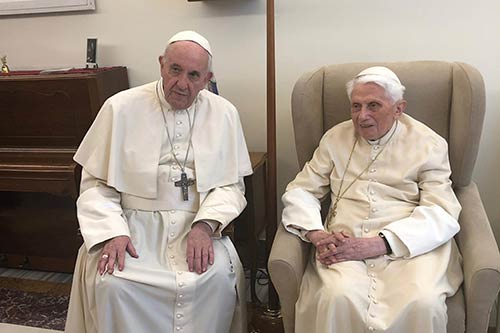
It would be weird, on a site devoted to liturgy, not to mention the decision of Pope Francis to reverse the decisions of his predecessor, Pope Benedict XVI, on the use of the 1962 Latin Mass.
Yes, there are more urgent issues to address in the world today – liturgy regularly gets that criticism. Yes, it was a surprise only two days after a papal hospitalisation that was twice as long as anticipated.
But, here we have it:
Pope Francis’ Motu Proprio Traditionis Custodis, and
Pope Francis’ letter explaining his Motu Proprio
I probably don’t need to repeat the details here:
Pope Benedict XVI expanded the allowance of the 1962 Latin Mass (a variant of the Tridentine Latin Mass) by removing the need to have permission from the diocesan bishop.
Pope Francis has restored the need of the diocesan bishop’s permission; forbidden its use in parish churches; required those presiding to affirm Vatican II; and required anyone ordained from now on who want to use the 1962 Latin Mass to receive Vatican allowance (via his diocesan bishop).
The response, already on this site’s social media (here and here), has included that Pope Francis is a tyrant, that his decision will be undone in the future, and Pope Benedict will triumph.
When Pope Benedict was in charge, those who supported his decision(s) berated others for disobedience and disrespect to the papacy. That approach quickly dissipated when Francis sat on the Chair of Peter.
That Francis is correct, that use of this Latin Mass expresses and fosters disunity within Roman Catholicism cannot be denied. Users of this Latin Mass form a church within a church; with evangelical zeal and a strong sense of certainty; an extremely savvy online presence; a strong following of young people – young people who appreciate certainty in our uncertain, post-modern world; and thriving and growing priestly and religious-life vocations in a church that sees those graphs normally on the downward trend (complete with traditional habits many/most have discarded since Vatican II).
Pope Francis may be understood as devolving authority from the Vatican to local contexts, often as understood by Vatican II, but in this case, underneath the seeming devolution back to diocesan bishops, there is a strong increase in papal power: yes, the diocesan bishop may give permission, but Pope Francis has severely limited how a bishop may give permission. This is a surprising ecclesiological shift: in this case, bishops are clearly branch delegates of the pope.
Pope Francis regularly condemns clericalism, but again, underneath this decision is an understanding that the Latin Mass is a clergy-driven movement. From where I sit, that may not be the case. It may very well be (at least as much) a lay-driven movement. By preventing such laity from participating in the Latin Mass they yearn for, is this not clericalism?
Down here, Christchurch, New Zealand, regarded by many as progressively Vatican II in approach, has a number of Latin-Mass communities, including religious orders with that central to their charism. It will take time to see how, in practice, this all settles down into reality – here and elsewhere.
Recently, the first time in church history – the 70th anniversary of the ordination to the priesthood of Pope Benedict XVI – was a low-key affair, probably missed by many/most. One wonders what Benedict makes of the undoing of one of his signature decisions.
Also, I wonder how many noticed the date of Francis’ Motu Proprio decision – 16 July is the date when East and West went into schism in 1054, a schism that has never been healed and shows no sign of being reparable.


